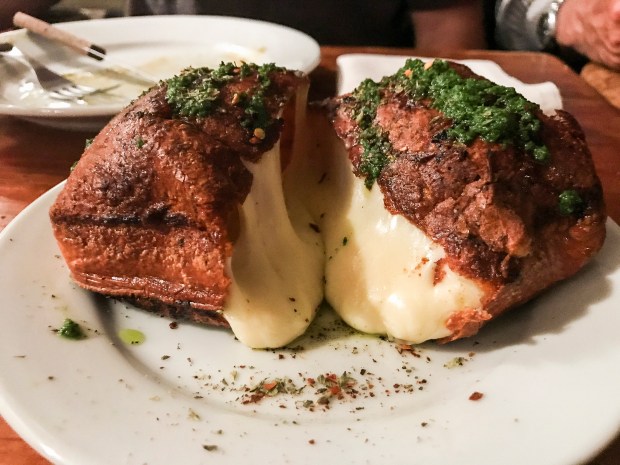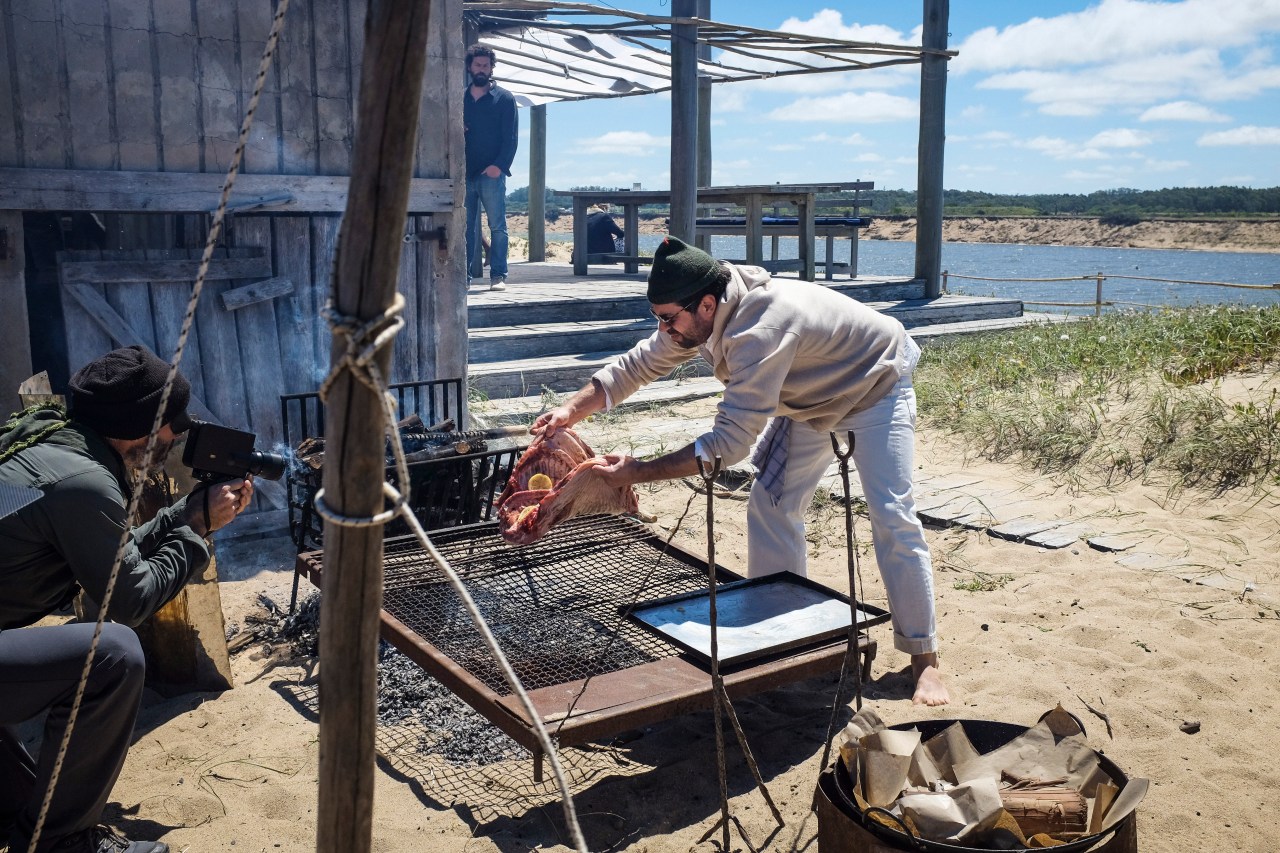Tony traveled to Uruguay this week with chef and restauranteur Ignacio “Nacho” Mattos. They ate some homemade tuco with Mattos’ abuela, devoured a chivito sandwich, and took a smoke break with Uruguay’s favorite punk band Hablan Por La Espalda. Stand-up comedian Jennifer Neal and Roads & Kingdoms co-founder Nathan Thornburgh rehash the episode.
Jennifer Neal: What initially struck me about this episode is that when Bourdain goes to a new place, he goes in with this feeling of exploration, like, “This is what I’m searching for” or “These are the questions.” In Uruguay, he was just like, “I love this country, I love these people, I love this food.” It’s just him hanging with his friends, eating his food, smoking his weed, drinking his beer.
Nathan Thornburgh: Yeah, he’s been there before, and that’s probably why he went back. He just likes it. He keeps asking his buddy Ignacio [Mattos], “Why don’t you move back here?”
So let’s get to the sandwich. But first, there was the candombé—the drum line—sequence right after the introduction.
Neal: You have this very captivating sequence with drums and people. When people talk about Uruguay as a melting pot, I assumed it was Italian and Spanish and Portuguese—Europeans. But when I saw the drum line and all of these people of different shades, it was interesting to me because I thought of Uruguay as being an especially white South American country. In fact, something like 10 percent of Uruguayans identify as mixed race. I wanted to see more of that.
Thornburgh: So on to the sandwich.
Neal: I’ve been waiting for this moment for a very long time, and that particular sequence of food porn did not disappoint. I give it a solid four and a half out of five stars. The ham, the cheese—what was I missing there?
Thornburgh: Steak, ham, and cheese up there. That’s the chivito. The national sandwich. We have this incredible recipe online. You can make up your own, though, if you’re just sitting around, thinking you’ve had too many greens. It’s just meat upon meat upon meat. That is the South American way, and I’m here for it.
Neal: Tony talks with Carina Novarese, a local journalist about the politics and history of Uruguay’s right-wing dictatorship [from 1973 to 1985], which was, in part, installed by the American government and the CIA.
What do you feel—as an American—when you hear stories like this? I cannot help but think about Facebook and the Cambridge Analytica scandal and how we’re outraged that social media in Russia pushing fascist causes in America—all of Latin America must be screaming with schadenfreude.
Thornburgh: Yet again, Tony is doing an episode from a place that has been grievously treated by the United States, and he comes not just as a world traveler but as an American. It’s always interesting to see him navigate that. As Americans, we all have our different crosses to bear when we travel overseas.
Jennifer, you live in Berlin, where progressives are not afraid to speak their mind about America’s past misdeeds. Do you get a lot of that heat? How do you deal with it?
Neal: I joke about this a bit in my stand-up. Western and Northern Europeans, Germans in particular, love to come up to me and hold me accountable for the actions of America. I’m going to tell you the same thing I tell them: Unless Donald Trump comes deep fried, smothered in hot sauce, and served in a bucket that says “Black lives matter,” I don’t want shit to do with him. When I go to brown and black countries, though, they’ll rant and rave about the American government but nudge me and say, “Well, you get it. You’re black.”

Thornburgh: Then you’ve got Tony, a white man. But he was presumably not responsible for Operation Condor.
Neal: Not as far as we know.
Thornburgh: It strikes me that I’m often in the position he’s in: He’s not responsible, [but] we have to take some kind of collective responsibility for this. That conversation with Carina was interesting, just to watch him absorb what she was saying.
Neal: A lot of Americans still probably have no idea about the United States government’s role in Latin America in the not-so-distant past. I like that he revisits that without shame, necessarily. It’s educating people about something that people need to be reminded of repeatedly.
Then he starts hanging out with these really interesting hardcore cats called Hablan por la Espalda.
Thornburgh: Correct. They got super high, went and hit some pizza joint—
Neal: Wait—what was the chickpea flatbread on top of pizza? When you’re super high, you’re obviously thinking munchies, but you’re also thinking about your gluten-free diet, and so you just combine the two? That would make sense in my mind.
Thornburgh: It’s a simple joy to watch stoned people eating stoned-people food. Maybe that could be Tony’s next show concept.
Neal: Apparently those guys were vegan at some point in their lives.
Thornburgh: I think one of them still was. Tony is obviously a noted a vegan agonist. He seems to enjoy turning the screw a little bit, but this was one of the best vegan-Tony encounters I’ve seen—or at least the friendliest.
Neal: So Bourdain keeps saying, “This is the country where you go to eat meat.” And I was a little skeptical until he took us to Carniceria Carnelandia.
Thornburgh: I’ve got to say, one of the things I find attractive about Uruguayan food culture is that it’s an unapologetic meat experience. How does this work for their diets? They seem to be doing all right. Maybe they can offset all that meat with a lot of red wine.
Neal: That’s a balanced diet right there. No vegetables, no water. Red wine with meat. They’re good.
They went to Nacho’s family home in Santa Lucía, and of course, Bourdain starts asking Nacho again, “Why would you leave this?” I felt a little bad for Nacho because he’s sitting there while Bourdain talks about him to his family, and his family is psychoanalyzing him. I go, “That’s why he left.”
Thornburgh: The thing about Nacho, which you don’t really get from this episode, is that the guy is a stirringly good cook. [His restaurant] Estela is the restaurant that the cooks go to eat in New York City. So Nacho’s quiet, he’s chill, he’s from this pretty little place. He’s catching a lot of shit from Tony for being a New Yorker. But this guy is a god in the kitchen.
Neal: I really liked that duality about his character. He seemed like a super-chill, relaxed dude. But once I did a little bit of research, I was like, “Who is this guy?” And he’s incredibly impressive, and I really need to head to his restaurant next time I’m in New York.
Thornburgh: Or he should just do like everybody else and open a restaurant in Berlin. After visiting Nacho’s family, they go to Cantina del Vigía, and they have all of this incredible food. As far as food porn metaphors go, that was definitely the money shot of the episode for me.
Neal: That provoleta. Just straight, hard, cheese porn bubbling up.
Thornburgh: Fair enough. I mean, you know, it’s hot, gooey cheese. What the heck else you want out of life? Are we going to see anything to top it this season?
Neal: Young man, we got a lot of food porn to get through. Anyway, there’s this really interesting scene where they’re just smoking weed on the beach, just because they can, and they’re waiting for Diego [Robino] to come pick them up. And you know how I was saying earlier in the episode that I don’t really see a lot of diversity here? When they’re driving with Diego and his car breaks down, I realized Diego was the black person in this episode—like, he could hold a temporary pass, you know? They go from the car breaking down to a drive-through, and I was like, “Yo, this is the blackest thing that’s ever happened on Parts Unknown.” I mean, at least on this episode.

Thornburgh: Ha. What’s next?
Neal: Then they have this really gorgeous cookout near the sea. It’s what you would want to do with your friends on a Sunday afternoon when the weather’s nice.
Thornburgh: It looked amazing.
Neal: How did you feel at the end of this episode? Did you feel like you wanted to go to Uruguay?
Thornburgh: It looks like a lovely place, even if I’m a little bored by it. But there’s room for all of those things in life. A place doesn’t have to blow your mind every minute or challenge everything you’ve ever thought about everything. If I was feeling stressed out, if life was getting rough, I would go there to cool off. What about you?
Neal: I would definitely go—if not just for the food, for the barbecue and the gooey cheese. That needs to happen before I die. Maybe that will be the reason I die. Who knows? There are worse ways to go.
Thornburgh: Yes, like lack of cheese. That would suck even more—“Died because she couldn’t get enough cheese …”
This conversation has been edited and condensed.